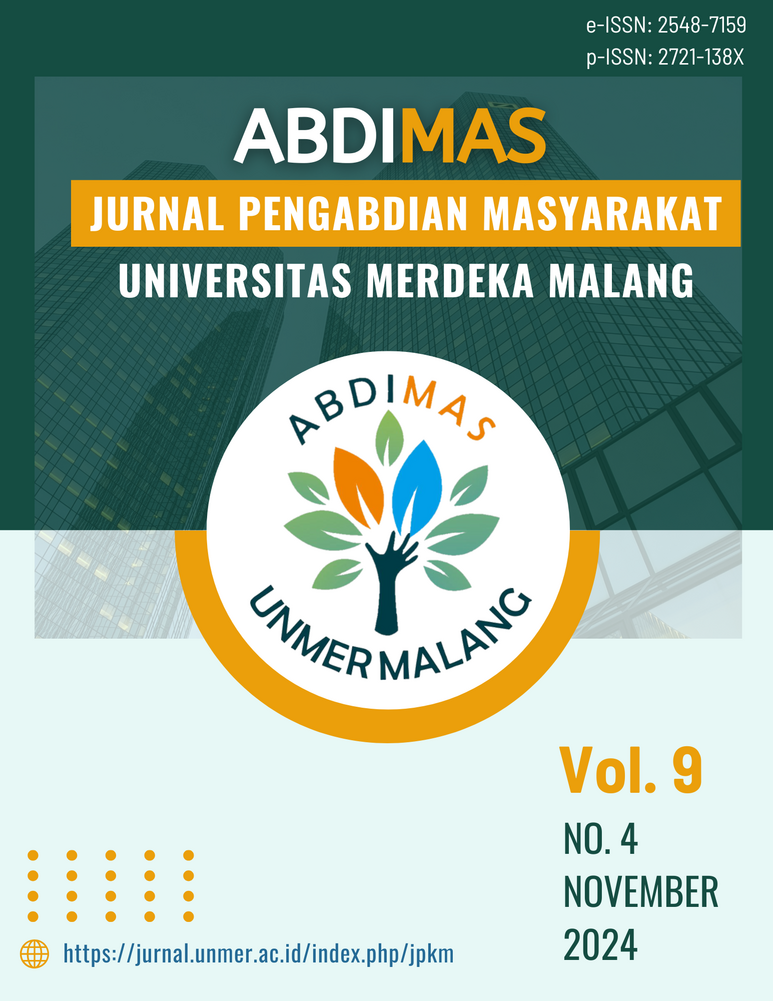Counseling-based child-friendly school support to enhance teacher knowledge and understanding
DOI:
https://doi.org/10.26905/abdimas.v9i4.13811Keywords:
Adolescent problems, Counseling, Elementary school studentsAbstract
This paper describes the implementation of counseling procedures and the process of identifying problems among elementary school students. Counseling conducted by classroom teachers serves as one of the strategies to address common issues in schools that partner with community service programs. This study applies the community service method, utilizing training and role-playing techniques. The aim of this training is to enhance teachers' empathy and active listening skills, enabling them to identify student problems and conduct basic counseling procedures effectively. Introducing and practicing counseling techniques represents a tangible step in preparing competent human resources to assist students in resolving both academic and non-academic challenges. This paper highlights the importance of a counseling approach for classroom teachers, emphasizing its role in fostering closer relationships with students and supporting them in finding solutions to their problems. The outcomes of this community service initiative include improved knowledge and understanding among teachers regarding the concepts and practical applications of counseling for students and their parents.
Downloads
References
Affandi, G. R., Laili, N., Hasanah, F. N., Syabana, A., & Hidayat, R. A. (2020). Modul pengembangan life skill dan konselor sebaya. Umsida Press. https://doi.org/10.21070/2020/978-623-6081-12-9
Ahmad, R., & Zadha, N. P. (2013). Importance of guidance and counseling in effective teaching and learning in school. The Communications Journal, 27(1), 115-122. https://dx.doi.org/10.31426/ijamsr.2018.1.9.332
Amala, A. K., & Kaltsum, H. U. (2021). Peran guru sebagai pelaksana layanan bimbingan dan konseling dalam menanamkan kedisiplinan bagi peserta didik di sekolah dasar. Jurnal basicedu, 5(6), 5213-5220. https://doi.org/10.31004/basicedu.v5i6.1579
American Counseling Association. (2023). What is Counseling? American Counseling Association. Retrieved from: https://www.counseling.org/mental-health-counseling/what-is-counseling
Dianovi, A., Siregar, D., Mawaddah, I., & Suryaningsih, S. (2022). Guidance and counselling in education. World Psychology, 1(2), 27-35. https://doi.org/10.55849/wp.v1i2.95
Eisenberg, N., Spinrad, T. L., & Valiente, C. (2018). Emotion-related self-regulation and children's social, psychological, and academic functioning. In K. Shigemasu, S. Kuwano, T. Sato, & T. Matsuzawa (Eds.), Diversity in harmony - Insights from psychology: Proceedings of the 31st International Congress of Psychology (pp. 268–295). John Wiley & Sons Ltd. https://doi.org/10.1002/9781119362081.ch14
Enachi-Vasluianu, L., & Mălureanu, F. (2016). The impact of the persuasive elements in the didactic discourse. eLearning & Software for Education, (2), 64-67. http://dx.doi.org/10.12753/2066-026X-16-092
Gartmeier, M., Bauer, J., Fischer, M. R., Hoppe-Seyler, T., Karsten, G., Kiessling, C., Möller, G. E., Wiesbeck, A., & Prenzel, M. (2015). Fostering professional communication skills of future physicians and teachers: Effects of e-learning with video cases and role-play. Instructional Science, 43, 443-462. https://doi.org/10.1007/s11251-014-9341-6
Handari, S. (2018). Efektifitas teknik bermain peran untuk meningkatkan keterampilan sosial anak Kota Samarinda (Studi kasus melalui pendekatan konseling anak). HISBAH: Jurnal Bimbingan Konseling Dan Dakwah Islam, 15(2), 45-65. https://doi.org/10.14421/hisbah.2018.152-04
Indonesian Psychology Association. (2010). Psychology code of ethics. HIMPSI Press.
Katsatasri, P. (2022). The development of a training package for student-teacher counseling skills. Journal of Education and Learning, 11(5), 107-112. https://doi.org/10.5539/jel.v11n5p107
Levitt, D. H. (2002). Active listening and counselor self-efficacy: Emphasis on one microskill in beginning counselor training. The clinical supervisor, 20(2), 101-115. https://doi.org/10.1300/J001v20n02_09
Muhammad, R. (2021). Analisis implementasi Permendikbud nomor 111 tahun 2014 tentang bimbingan dan konseling. Jurnal Ilmiah Edukatif, 7(1), 53-65. https://doi.org/10.37567/jie.v7i1.518
Muslikah, M., Hariyadi, S., & Amin, Z. N. (2016). Pengembangan model peer counseling sebagai media pengalaman praktik konseling. Indonesian Journal of Guidance and Counseling: Theory and Application, 5(1), 48-52. https://doi.org/10.15294/ijgc.v5i3.13509
Musslifah, A. R. (2021). Implementasi pelayanan bimbingan konseling berdasarkan panduan Kemendikbud 2016. Academic Journal of Psychology and Counseling, 2(1), 1-24. https://doi.org/10.22515/ajpc.v2i1.3405
Mutswanga, P., & Chivasa, N. (2014). A critical analysis of counselling principles that teachers could use as teaching methods to resolve intra-personal conflict of learners with disabilities in Zimbabwe. International Journal of Humanities Social Sciences and Education (IJHSSE), 1(11), 145-152.
Nelissa, Z., Hikmah, H., & Martunis, M. (2020). Penerapan panduan operasional penyelenggaraan bimbingan dan konseling pada layanan bimbingan dan konseling. Jurnal Riset Tindakan Indonesia, 5(2), 13-21. https://doi.org/10.29210/3003631000
Orchowski, L. M., & Berkowitz, A. D. (2022). Chapter 13-The integrated model of sexual aggression: A synthesis of 30 years of research and practice. In L. M. Orchowski & A. D. Berkowitz (Eds.), Engaging boys and men in sexual assault prevention (pp. 311-339). Academic Press. https://doi.org/10.1016/B978-0-12-819202-3.00022-5
Öztabak, M. Ü. (2018). Examination of the perceptions on the view of preschool teachers about school counselor. Journal of Education and Training Studies, 6(6), 13-24. https://doi.org/10.11114/jets.v6i6.2682
Sauer, D. (2017). Parent-teacher counseling: On'blind spots' and didactic perspectives. A qualitative-reconstructive study on teachers' counseling responsibilities. Journal for Educational Research Online, 9(3), 47-81. https://doi.org/10.25656/01:15301
Supratiknya, A. (2011). Psikoedukasi: Merancang program dan modul (Revisi Ed.). Universitas Sanata Dharma Press.
Telaumbanua, K. (2016). Konsep dasar layanan bimbingan dan konseling di sekolah dasar. Warta Dharmawangsa, (49). https://doi.org/10.46576/wdw.v0i49.167
UNICEF. (2009). Child-friendly school manual. UNICEF Division of Communication.
Walker, J. M., & Dotger, B. H. (2012). Because wisdom can’t be told: Using comparison of simulated parent–teacher conferences to assess teacher candidates’ readiness for family-school partnership. Journal of Teacher Education, 63(1), 62-75. https://doi.org/10.1177/0022487111419300
Downloads
Published
How to Cite
Issue
Section
License
Copyright (c) 2024 Abdimas: Jurnal Pengabdian Masyarakat Universitas Merdeka Malang

This work is licensed under a Creative Commons Attribution-ShareAlike 4.0 International License.
Authors who publish with this journal agree to the following terms:
- Copyright of the published articles will be transferred to the journal as the publisher of the manuscripts. Therefore, the author confirms that the copyright has been managed by the journal.
- Publisher of Abdimas: Jurnal Pengabdian Masyarakat Universitas Merdeka Malang is University of Merdeka Malang.
- The copyright follows Creative Commons Attribution-ShareAlike License (CC BY SA): This license allows to share, copy, and redistribute the material in any medium or format, adapt, remix, transform, and build upon the material, for any purpose, even commercially.





